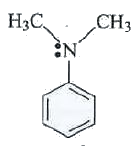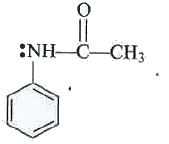Which of the following compounds will not undergo azo coupling reaction with benzene diazonium chloride?
Aniline
Phenol
Anisole
Nitrobenzene
To determine which compound will not undergo azo coupling reaction with benzene diazonium chloride, we need to analyze the nature of each compound provided in the options.
1. Understanding Azo Coupling Reaction:
- Azo coupling is a reaction where a diazonium salt (like benzene diazonium chloride) reacts with an aromatic compound to form an azo compound. This reaction typically occurs between an electrophile (the diazonium ion) and a nucleophile (the aromatic compound).
- The reaction is favored when the aromatic compound has electron-donating groups, which increase the nucleophilicity of the ring.
2. Analyzing the Options:
- Aniline (C6H5NH2): Aniline has an amino group (-NH2) which is an electron-donating group. Therefore, aniline can undergo azo coupling with benzene diazonium chloride.
- Phenol (C6H5OH): Phenol has a hydroxyl group (-OH) which is also an electron-donating group. Thus, phenol can also undergo azo coupling.
- Anisole (C6H5OCH3): Anisole contains a methoxy group (-OCH3), which is another electron-donating group. Therefore, anisole can participate in azo coupling as well.
- Nitrobenzene (C6H5NO2): Nitrobenzene has a nitro group (-NO2), which is an electron-withdrawing group. This means that it decreases the electron density on the aromatic ring, making it less nucleophilic. As a result, nitrobenzene cannot undergo azo coupling with benzene diazonium chloride.
3. Conclusion:
- Among the given options, nitrobenzene is the compound that will not undergo azo coupling reaction with benzene diazonium chloride. Therefore, the correct answer is option D: Nitrobenzene.
- Azo coupling is a reaction where a diazonium salt (like benzene diazonium chloride) reacts with an aromatic compound to form an azo compound. This reaction typically occurs between an electrophile (the diazonium ion) and a nucleophile (the aromatic compound).
- The reaction is favored when the aromatic compound has electron-donating groups, which increase the nucleophilicity of the ring.
- Aniline (C6H5NH2): Aniline has an amino group (-NH2) which is an electron-donating group. Therefore, aniline can undergo azo coupling with benzene diazonium chloride.
- Phenol (C6H5OH): Phenol has a hydroxyl group (-OH) which is also an electron-donating group. Thus, phenol can also undergo azo coupling.
- Anisole (C6H5OCH3): Anisole contains a methoxy group (-OCH3), which is another electron-donating group. Therefore, anisole can participate in azo coupling as well.
- Nitrobenzene (C6H5NO2): Nitrobenzene has a nitro group (-NO2), which is an electron-withdrawing group. This means that it decreases the electron density on the aromatic ring, making it less nucleophilic. As a result, nitrobenzene cannot undergo azo coupling with benzene diazonium chloride.
- Among the given options, nitrobenzene is the compound that will not undergo azo coupling reaction with benzene diazonium chloride. Therefore, the correct answer is option D: Nitrobenzene.
Topper's Solved these Questions
- AMINES BOOK - NCERT FINGERTPS ENGLISHCHAPTER - AMINES EXERCISE - NCERT EXEMPLER PROBLEMS
3 Videos
- AMINES BOOK - NCERT FINGERTPS ENGLISHCHAPTER - AMINES EXERCISE - ASSERTION & REASON CORNER
14 Videos
- AMINES BOOK - NCERT FINGERTPS ENGLISHCHAPTER - AMINES EXERCISE - HOTS
6 Videos
- ALDEHYDES, KETONES AND CARBOXYLIC ACIDSBOOK - NCERT FINGERTPS ENGLISHCHAPTER - ALDEHYDES, KETONES AND CARBOXYLIC ACIDSEXERCISE - Assertion And Reason
15 Videos
- BIOMOLECULESBOOK - NCERT FINGERTPS ENGLISHCHAPTER - BIOMOLECULESEXERCISE - Assertion And Reason
15 Videos
Similar Questions
Knowledge Check
Which of the following compounds can give coupling reaction with benzene diazonium salt ?
A B
B C
C D
D
Which of the following compounds will undergo Cannizzaro reaction ?
ACH3CHOBCH3COCH3CC6H5CHODC6H5CH2CHOWhich of the following will not undergo HVZ reaction ?
APropanoic acidBEthanoic acidC2 - Methylpropanoic acidD2, 2 - Demethylpropanoic acid
Which of the following compounds gives azo dye test ?
View SolutionWhich of the following compounds will not undergo Friedel− Crafts reaction easily ?
View SolutionWhich of the following compounds will not undergo Friedel− Crafts reaction easily ?
View SolutionWhich of the following will undergo addition reactions ?
View SolutionWhich set of the following compound(s) give benzene on reaction with PhMgBr?
View Solution